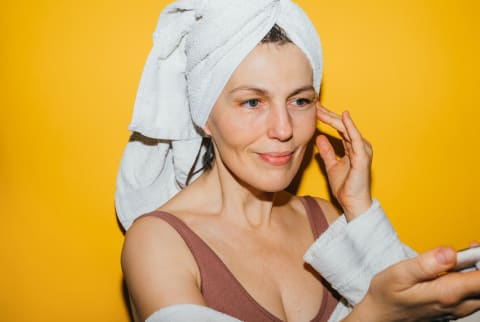
September 13, 2021 — 9:10 AM
If you’ve spent some time in my section, you likely know that we take beauty advice from a wide variety of experts. Sure, dermatologists, aestheticians, makeup artists, and hairstylists make up the core of experts—but we also talk to individuals like joy strategists, psychologists, chemists, sleep experts, eco-justice advocates, and spiritual leaders. Why? Beauty can take many forms—and all are valid.
And one way we are particularly interested in beauty is how you can optimize your skin health through what you consume, like your diet and supplements. And to get to the bottom of this, who better to talk to than a registered dietitian and nutrition scientist with a doctorate in foods and nutrition, like our very own director of scientific affairs Ashley Jordan Ferira, PhD, RDN. This week she joins my podcast Clean Beauty School to chat about the vast world of beauty supplements, dietary choices for your skin, and her own skin care journey. (Check it out—we cover a lot of ground.)
And while we get quite technical and into the science weeds, the crux of the episode is about how skin care is never just about vanity: “Just because your skin is literally placed superficially doesn’t mean you can treat it superficially,” she tells us.
Here, how she takes care of her own skin:
glow-from-the-inside-out bundle+
Go deep beyond the surface with cellular beauty+ and beauty & gut collagen+

Ferira works in-house on our supplement range—and thus knows the ins, outs, and everything else about supplement formulation. And for her skin care and beauty needs specifically, she utilizes mbg’s beauty & gut collagen+ and cellular beauty+.*
She goes on to explain that you can think of the ingredients in beauty & gut collagen+ as your skin’s baseline: “This is the daily foundational base of skin essentials. It has 17.7 grams of collagen peptides—type I and type III—so we’re not messing around here with the dose,”* she says. “Then it has seven other ingredients. We have hyaluronic acid, L-glutamine, biotin, vitamins C and E, turmeric root extract, and broccoli seed extract, delivering this powerhouse phytochemical known as sulforaphane glucosinolate.”
Then to top that off? mbg’s cellular beauty+: “We created, I think the best ‘from the inside out’ beauty supplement on the market,” she says. “It’s got these four ingredients that are going to make your skin look and feel healthier.* We have CoQ10 in the ubiquinol form, astaxanthin derived from sustainable green algae, a pomegranate whole fruit extract, and then phytoceramides.”
Some people like to view supplements as a Band-Aid over less-than-ideal eating habits.
“Let’s be clear: Supplements are supplementary and targeted, but hopefully there is this delightful nutrient-dense diet as the foundation,” she reminds us. And while an entire episode could be dedicated to food choices that can support your skin (and there likely will be in the future), here she discusses three easy areas to address first-and-foremost:
- Hydration. “You should be very intentional about hydration from the point that you wake up and then throughout the day,” she says. “Give your body the H2O it needs for almost every cellular reaction, skin included.”
- Less sugar. “When I think of consuming less sugar, I like to flip it on the positive: What should our sources of sugar be? Think colorful fruits, veggies, and slow carbs.” Additionally, processed sugar has been shown to break down collagen, as it leads to hardening and fragmentation of collagen.
- Fiber. “We have a huge fiber gap in our nation—and the thing is when you focus on fiber, what you’re focusing on is coloring your plate: fruits and vegetables, whole grains, legumes, seeds, spices, and herbs,” she says. Not to mention, a diet rich in fiber supports a healthy gut—and as we talk about plenty around here, the gut and the skin are highly connected via the gut-skin axis.
3. Using topical approaches in combination with internal care.
Just because Ferira’s work is dedicated to internal approaches to health and well-being, that doesn’t mean it’s the only option.
“The benefit of taking oral nutrients is you are not limited by time and space: Beauty routines take time, and we may not be paying attention to our whole bodies. But oral nutrients help the entire body and do so rather quickly, meaning taking them is not time-consuming [like a skin care routine might be],” she says.
But when people ask her what’s better: Using oral or using topical? Well, her answer is quite simple: “Well, both sound good to me!”
See, it’s not just team supplement or team topical: As we note in our conversation, you can use both routes synergistically for optimal results. “It always depends on the individual person, budget, and their goals, but to me, it makes sense to use oral supplements for a more broad approach, and then utilizing target topicals on the outside. I think that they absolutely don’t need to compete—that they’re complementary,”* she says.
If you’re looking for more engaging beauty conversations, listen to our new beauty podcast, Clean Beauty School. Subscribe on iTunes, Google Podcasts, or Spotify.
If you are pregnant, breastfeeding, or taking medications, consult with your doctor before starting a supplement routine. It is always optimal to consult with a health care provider when considering what supplements are right for you.
https://www.mindbodygreen.com/articles/im-a-rd-and-phd-this-is-how-i-care-from-the-inside-out








